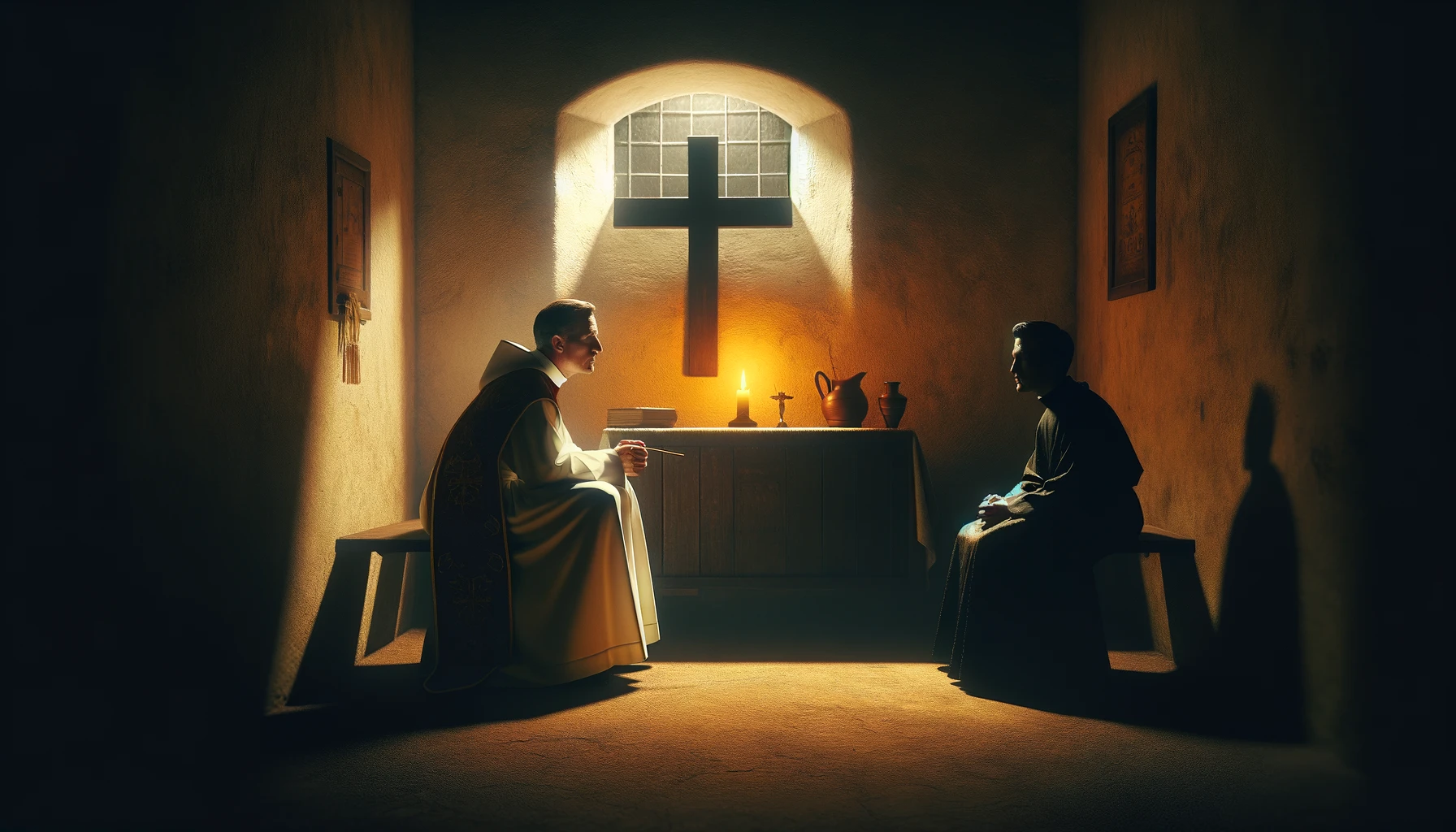Home>Christian Life>When Was The Belgic Confession Written


Christian Life
When Was The Belgic Confession Written
Published: March 4, 2024
Peter Smith, Editorial Director at Christian.net, combines deep insights into faith, politics, and culture to lead content creation that resonates widely. Awarded for his contributions to religious discourse, he previously headed a major organization for religious communicators, enhancing dialogue on faith's societal impacts.
Learn about the Belgic Confession, a significant Christian document written in the 16th century, and its impact on Christian life. Understand its historical and theological significance.
(Many of the links in this article redirect to a specific reviewed product. Your purchase of these products through affiliate links helps to generate commission for Christian.net, at no extra cost. Learn more)
Table of Contents
Introduction
When was the Belgic Confession written? The Belgic Confession, also known as the Confession of Faith of the French Reformed Churches, is a significant document in the history of the Reformed tradition. It serves as a statement of faith and a doctrinal standard for Reformed churches around the world. The origins and historical context of the Belgic Confession shed light on its importance and enduring relevance in the realm of religious thought and practice. In this article, we will delve into the historical background, authors, writing and publication, content and structure, as well as the impact and legacy of the Belgic Confession.
Read more: When Were The Gospels Written?
Historical Background
The historical background of the Belgic Confession is rooted in the tumultuous religious landscape of the 16th century. During this period, Europe was undergoing significant religious and theological upheaval, with the Protestant Reformation challenging the authority of the Roman Catholic Church. In the Low Countries, present-day Netherlands, Belgium, and Luxembourg, the Reformation took hold, leading to the establishment of Reformed churches. However, these churches faced persecution and oppression from the ruling authorities, particularly under the Spanish Crown.
Amidst this environment, there arose a need for a clear and comprehensive statement of faith that could articulate the beliefs and convictions of the Reformed churches while also serving as a defense against persecution and false accusations. The historical backdrop of religious persecution and the desire for doctrinal clarity set the stage for the creation of the Belgic Confession, which would come to symbolize the Reformed faith in the face of adversity.
The historical context of the Belgic Confession is also intertwined with the broader Reformed tradition and the influence of key figures such as John Calvin and Theodore Beza. The theological developments and debates within the Reformed tradition contributed to the formulation of the confession, reflecting the doctrinal distinctives and theological emphases of Reformed theology during that era. This historical background provides crucial insights into the motivations and circumstances that led to the writing of the Belgic Confession, highlighting its significance within the broader tapestry of Reformed history and theology.
Authors of the Belgic Confession
The Belgic Confession was primarily authored by Guido de Brès, a prominent Reformed theologian and minister who played a pivotal role in the development of the Reformed tradition in the Low Countries. De Brès, a native of Hainaut in present-day Belgium, was deeply influenced by the teachings of John Calvin and became a fervent advocate for the Reformed faith. His experiences as a preacher and his unwavering commitment to the Reformed cause positioned him as a key figure in the composition of the Belgic Confession.
De Brès, along with other Reformed ministers and theologians, sought to articulate the core tenets of the Reformed faith in response to the challenges and opposition faced by the Reformed churches in the Low Countries. The authors of the Belgic Confession drew upon their theological acumen, biblical scholarship, and pastoral insights to craft a confession that not only affirmed their beliefs but also provided a robust defense of the Reformed faith in the face of persecution and doctrinal controversies.
The collaborative effort of these Reformed theologians and ministers underscores the communal nature of the confession's authorship, reflecting the shared commitment of the Reformed churches to uphold their faith and doctrine in the midst of adversity. The authors of the Belgic Confession, led by Guido de Brès, demonstrated a steadfast dedication to preserving and propagating the Reformed faith, leaving a lasting legacy through their collective authorship of this seminal confession of faith.
Writing and Publication of the Belgic Confession
The writing and publication of the Belgic Confession marked a significant milestone in the history of the Reformed churches in the Low Countries. Guido de Brès, along with other Reformed theologians and ministers, undertook the task of composing this confession of faith, drawing upon their theological insights and doctrinal convictions. The process of writing the confession involved meticulous attention to biblical exegesis, theological precision, and pastoral relevance, as the authors sought to articulate the core beliefs of the Reformed tradition in a comprehensive and compelling manner.
After the completion of the Belgic Confession, efforts were made to ensure its widespread publication and dissemination. The confession was first presented to the ruling authorities in the Low Countries as a testimony of the Reformed churches' faith and a plea for religious liberty. Subsequently, the confession was officially adopted by a synod of Reformed churches in 1561, affirming its status as a doctrinal standard for the Reformed tradition in the region.
The publication of the Belgic Confession extended beyond the borders of the Low Countries, as it garnered attention and recognition among Reformed churches in other parts of Europe. Translations of the confession into various languages facilitated its reach and impact, enabling Reformed communities across different regions to embrace and uphold its doctrinal affirmations. The widespread dissemination of the Belgic Confession contributed to its enduring influence and established it as a foundational document of Reformed theology.
The writing and publication of the Belgic Confession exemplify the commitment of the Reformed churches to articulate their faith with clarity and conviction, despite facing opposition and persecution. The confession's publication served as a bold declaration of the Reformed churches' beliefs and a testament to their unwavering adherence to the principles of the Reformed tradition. The process of writing and publishing the Belgic Confession reflects the resilience and determination of the Reformed churches to uphold their faith in the face of adversity, leaving an indelible mark on the history of Reformed theology.
Content and Structure of the Belgic Confession
The Belgic Confession consists of 37 articles that systematically expound upon the doctrinal beliefs and theological convictions of the Reformed tradition. The confession is structured in a logical and comprehensive manner, addressing key aspects of Christian doctrine and faith. The articles cover a wide range of theological topics, including the nature of God, the authority of Scripture, the doctrine of salvation, the sacraments, the church, and the Christian life. Each article is carefully crafted to provide a clear and coherent exposition of the Reformed understanding of these essential theological themes.
The confession begins with a robust affirmation of the Triune God, emphasizing the unity and distinction within the Godhead. It proceeds to elucidate the authority and sufficiency of the Holy Scriptures as the foundation of Christian faith and doctrine. The Belgic Confession also articulates the Reformed perspective on the doctrine of God's providence, the creation and fall of humanity, and the person and work of Jesus Christ as the savior of humanity.
Furthermore, the confession addresses the role of the church as the community of believers, the significance of the sacraments of baptism and the Lord's Supper, and the Christian's response to God's grace in a life of gratitude and obedience. The confession's systematic and thorough treatment of these doctrinal themes reflects the Reformed commitment to a comprehensive and coherent understanding of the Christian faith.
The structure of the Belgic Confession demonstrates a deliberate and meticulous approach to presenting the core tenets of the Reformed tradition. Each article builds upon the preceding ones, forming a cohesive theological framework that encapsulates the Reformed understanding of God, humanity, salvation, and the Christian life. The confession's clarity, precision, and theological depth contribute to its enduring significance as a doctrinal standard for Reformed churches worldwide.
The Belgic Confession's content and structure not only serve as a doctrinal guide for Reformed communities but also exemplify the Reformed commitment to theological clarity, biblical fidelity, and doctrinal coherence. The confession's systematic exposition of Christian doctrine continues to inform and shape the faith and practice of Reformed churches, embodying the enduring legacy of the Reformed tradition in its theological richness and doctrinal precision.
Read more: When Were The Homeric Hymns Written?
Impact and Legacy of the Belgic Confession
-
Doctrinal Standard: The Belgic Confession has endured as a foundational doctrinal standard for Reformed churches worldwide. Its systematic exposition of Reformed theology has provided a theological framework for understanding and articulating the core beliefs of the Reformed tradition.
-
Theological Influence: The confession's theological influence extends beyond the 16th century, shaping the development of Reformed theology and doctrine. Its emphasis on the sovereignty of God, the authority of Scripture, and the centrality of Christ has left an indelible mark on the theological identity of Reformed churches.
-
Defining Reformed Identity: The Belgic Confession has played a pivotal role in defining the identity of Reformed communities. It has served as a unifying symbol of faith, fostering a sense of theological coherence and doctrinal unity among Reformed churches.
-
Perseverance and Witness: The confession stands as a testament to the perseverance and witness of the Reformed churches amidst adversity. Its publication in the face of persecution reflects the unwavering commitment of Reformed believers to uphold their faith and doctrine, even in the most challenging circumstances.
-
Global Reach: The impact of the Belgic Confession has transcended geographical boundaries, influencing Reformed communities across different continents. Translations of the confession into various languages have facilitated its global reach, enabling Reformed believers worldwide to embrace its doctrinal affirmations.
-
Educational Tool: The confession continues to serve as an educational tool for teaching and nurturing the next generation of Reformed believers. Its systematic presentation of Christian doctrine provides a valuable resource for theological education and discipleship within Reformed churches.
-
Ecclesiastical Affirmation: The Belgic Confession has been reaffirmed by numerous synods and church assemblies, reaffirming its enduring relevance and significance within the life of Reformed churches. Its status as a confessional standard underscores its ongoing impact on the faith and practice of Reformed communities.
-
Cultural and Historical Significance: The confession holds cultural and historical significance, reflecting the enduring legacy of the Reformed tradition in the broader tapestry of Christian history. Its impact on the religious landscape of the Low Countries and beyond underscores its enduring legacy in the annals of Christian faith.
The Belgic Confession's impact and legacy resonate through the centuries, embodying the enduring influence of the Reformed tradition and its commitment to theological clarity, biblical fidelity, and doctrinal coherence.
Conclusion
In conclusion, the Belgic Confession stands as a testament to the enduring legacy of the Reformed tradition and its unwavering commitment to theological clarity, doctrinal precision, and biblical fidelity. The confession's historical background, authors, writing and publication, content and structure, as well as its impact and legacy, collectively underscore its significance as a foundational document of Reformed theology. From its origins in the religious upheaval of the 16th century to its enduring influence on Reformed churches worldwide, the Belgic Confession continues to embody the theological richness and doctrinal coherence of the Reformed tradition. Its systematic exposition of Christian doctrine, its role as a unifying symbol of faith, and its global impact exemplify the enduring relevance and significance of the confession within the broader tapestry of Christian history. As a doctrinal standard, educational resource, and theological guide, the Belgic Confession remains a cornerstone of Reformed identity and theological heritage, shaping the faith and practice of Reformed communities with its enduring legacy.














